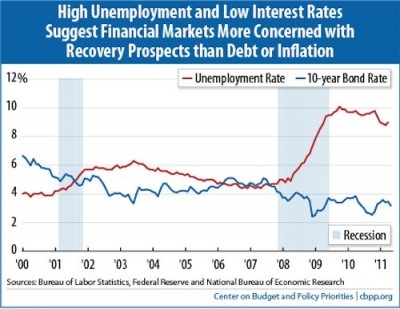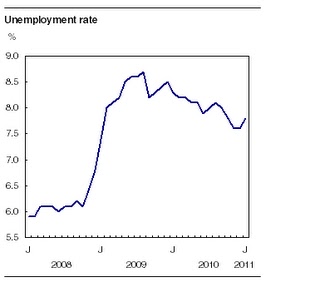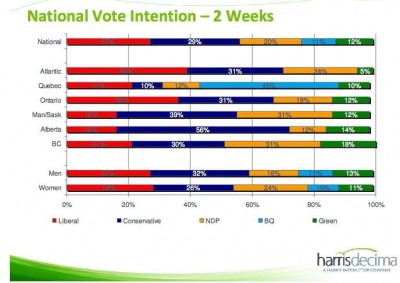
Today, the Canadian Finance Minister Jim Flaherty tabled a budget with plenty of emphasis on reducing the deficit, much like what’s going on in the US. This, despite the fact that the interest rates are telling a story where financial markets are not that concerned about the deficit. This pattern is evident in both Canada and the US. Interest rates are showing there’s no crowding out—government spending taking up capital and resources that businesses can use. The reality of the situation is uncertainty and a dearth of good prospects is causing the business community to sit on huge stocks of capital.
Nevertheless, for various political reasons the deficit is touted as a menace that must be dealt with, not just in North America, but globally. The media is contributing to the Jedi mind trickery, dubbed the “Beltway Deficit Feedback Loop”. The WaPo blog by Greg Sargent states::
“The relentless bipartisan focus on the deficit convinces voters to be worried about it, which in turn leads lawmakers to spend still more time talking about it and less time talking about the economy,”
while linking to a National Journal study examining the gap between mentions of “unemployment” versus “deficit”::
“the broadening gap demonstrates just how effective conservatives have been at changing the narrative of economic policy from one dominated by talk of fiscal stimulus to one now in lockstep with notions of fiscal austerity.”
In Canada, the opposition parties aren’t on the same page with the Finance Minister and the Conservative Party, but don’t have the votes to stop the budget. While ink is being spilled about how fast the deficit will be reduced in Canada and whether of not the Conservative projections are wide of the mark and overly rosy, the elephant in the living room is the lingering high unemployment rate::

The problem with the deficit discourse is it fails to address the issue of unemployment and real economic problems, with the only way the issue goes away is if the economy grows. In fact, I feel being a deficit hawk in this economic climate is playing with political dynamite. The economic indicators do not support deficit reduction, given that the business community is loathe to expand. So, if the deficit hawks are wrong and unemployment and economic stagnation persists, they are opening themselves up to criticism. I think the hope is that a business cycle upswing will render the deficit issue moot, so the perception is that it’s “riskless” to jump on the deficit reduction bandwagon.
In the US, both Democrats and Republicans are viewing the deficit as the evil menace that must be thwarted at all costs with ample help of the media. While a Republican presidential candidate would differentiate themselves by embracing a populist and expansionary economic approach, it would be political suicide. Any politician advocating increases in government spending would face an uphill battle and be forced to educate the public on matters many don’t have the time and the patience for.
The jury is still out on how the New Democrats and Liberals play the deficit card in Canada in the future, but it may be an easy one to play if unemployment remains relatively high, businesses remain tentative, and the economy continues to stagnate.


